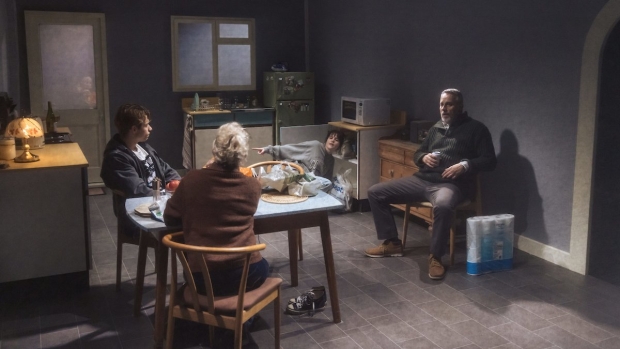”Here” at Southwark Playhouse – review

© The Other Richard
If you’re going to force your audience to watch an entire two-act play through a murky scrim, you’d better have a good reason for that, or else ensure that there’s a story, characters and dialogue that will burst through the alienating gloom and make the experience vital, vivid, or at least relatable. Unfortunately, Clive Judd’s debut script and George Turvey’s bizarrely inept direction do none of the above, giving us instead a pedestrian kitchen sink drama-cum-vague ghost story with under-explored nods to existentialism and the supernatural.
This year’s Papatango New Writing Prize winner centres on 25-year-old Matt (Sam Baker-Jones in a creditable professional debut) returning from London to the Midlands family homestead and facing the latent, and not-so-latent, resentments and miseries of a trio of people who have all lived together for far too long. Those people are his Mum’s family, and they’re a whiney, discontented bunch: there’s boozy, mouthy aunt Monica (gamely portrayed by Lucy Benjamin), her cowed, gambling addict husband Jeff (Mark Frost, extracting real light and shade out of sometimes intractable material) and their self-absorbed daughter Jess (Hannah Millward), a morose lesbian given to expressing herself in quasi-poetic utterances such as “Edges. I feel like I’m edges…But there’s nothing else. Nothin’ in the middle.” Anybody old enough to remember those punishingly realistic Play For Today dramas that the BBC used to churn out in the ’70s and ’80s just in case the populace at large weren’t already depressed enough, will find this grimly familiar.
Having set all that up, Judd then introduces other-worldly elements, such as unexpected noises and a barely-there voice that only comes through on mobile phone recordings made in an apparently silent room, and it looks briefly as though we might be off into chilling, intriguing Conor McPherson territory…but no such luck. Here more resembles the disappointing Barney Norris piece, We Started To Sing, which reopened the Arcola back in the spring and was another trawl through the minutiae of family life that threatened to prove deeply tedious for anybody who wasn’t part of said family.
It’s not that Judd can’t write: there are some tartly funny one-liners and this dysfunctional family sounds suitably authentic, plus there are a couple of striking individual speeches that might work out of context as audition pieces. The best of these, Monica’s vitriolic rejection of the kids and ever younger teachers she works with as well as her daughter’s unsuitable girlfriend, delivered with relish by Benjamin, has genuine shock value in the depth of its venom, and coruscates an otherwise inert scene. Mostly though, it’s hard to escape the impression that, while unfinished sentences and suppressed, unexamined feelings may well be the basic tenets of family life, they have little theatrical currency when presented so baldly on stage, and the random bunging in of some ghostly, mostly unexplained, stuff at the end of each act, does not equal satisfying drama.
Jasmine Swan’s set, a realistic kitchen but with gauzy transparent walls, has an appropriately ethereal feel, but suffers from being on an apron stage with the audience arranged on three sides. Turvey’s static blocking makes for really problematic sight lines for anybody sitting on the edges, with views blocked for long stretches by sideboards or a microwave. Even from a dead centre position, I watched one key mother-daughter exchange looking at the back of one characters head which in turn completely obscured the face of the person opposite her with whom she was playing the scene. Surely this is a play that would benefit either from being presented in a traditional end-on configuration so that we can all see everything, or in the particular intimacy of an in-the-round staging. Turvey’s production though is curiously uninvolving and lacks clarity, issues further exacerbated by the perverse decision to keep a thin screen of material between audience and cast throughout the entire performance. In the interval I nearly asked a front of house team member if there was a technical issue and whether the curtain should have flown out by now, but by the end of a plodding two-and-a-half-hour evening, I didn’t much care.
Last year’s Papatango offering was Igor Memic’s muscular, beautiful Old Bridge, a memory play that soared and seared as it dealt with evolving cultural traditions and a doomed love story against the fall of Bosnia. This year’s winner is much more intimate in scale but feels clichéd, and dismayingly narrow in its viewpoints and ambition. If Judd’s point is that boredom and non-sequiturs are a part of day-to-day life, then his work here is successful, but sadly that doesn’t make a very riveting play.












